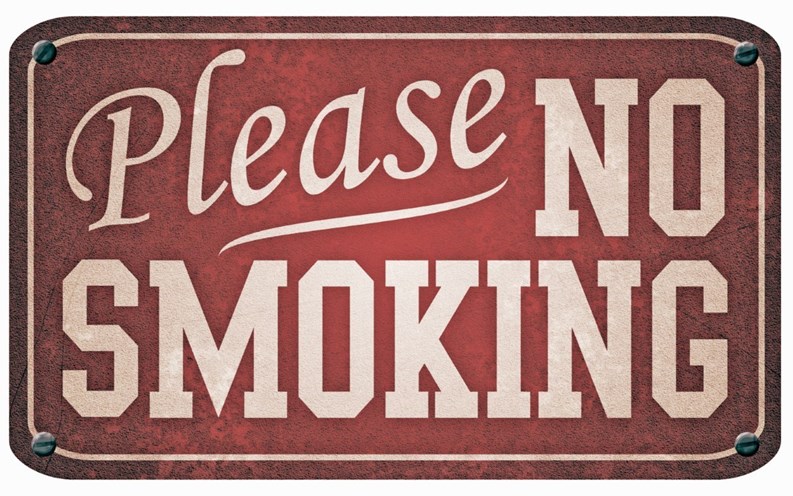The late 1990s saw a surge of nationwide smoking restrictions put into effect. State by state, legislation banning smoking in various settings was proposed and passed into law. With varying amounts of resistance and controversy, workplaces, shops, theaters, restaurants and bars in a growing number of cities—including New York City—all went smoke-free.
More recently, as the tide of public and medical opinion has turned more decisively against smoking, administrators in some co-op and condo buildings have attempted to ban smoking not just in common areas, but in private apartments as well. Unlike previous bans, no government intervention is being sought to help make these residential buildings smoke-free. Boards are weighing the legal, moral and economic repercussions of such a decision and sometimes choosing to self-enact smoking bans.
While few would debate the health benefits of an entirely smoke-free building, questions abound whenever a board attempts to regulate residents’ behavior to such a degree. Is it morally right to impose restrictions on neighbors’ private residences? How will such decisions impact the building community’s cohesiveness? How will placing such restrictions on private units affect their resale value? And perhaps most important, is banning smoking in private apartments even legal?
Is It Legal?
Most boards and associations aren’t entirely clear what their rights and limitations are when it comes to restricting smoking within their building. Confusion often arises because while most state statutes give boards virtually free rein to regulate their own common areas, they have far less latitude to infringe upon or place restrictions on private units.
“There are some cases dealing with low income housing where Housing and Urban Development (HUD) has strongly urged the public housing authorities to implement a smoking ban,” says Eva Talel, an attorney with the Manhattan-based law firm of Stroock & Stroock & Lavan. “And there are a lot of residential rental landlords in New York who have started to ban smoking in their buildings— and these are some of the big developers like Related, Kenbar, Pan Am, as well as other smaller developers. I think that if a [co-op or condo] building wanted to implement a smoking ban, it could do so, but we would suggest that things be done in a way that would make them more likely to be upheld in court. For instance, we would prefer to see such a ban adopted by shareholder action rather than just by board action. Having an overriding majority of the occupants vote to take this step as opposed to just a board of seven, nine, eleven, or whatever the case may be would give the court a much greater comfort level.”
A majority vote, which is defined by a building’s bylaws and differs from community to community, would be needed to pass an owner-initiated smoking ban amendment. The process itself is a simple one, but how smoothly the process moves along is dependent on the community itself and how strongly owners might feel about such an amendment.
“It can be an easy process,” says Christopher Banthin, director and senior staff attorney for the non-profit Public Health Advocacy Institute (PHAI). “The reason that it is easy is due in part because the law bows and favors the community wishes.” A 2008 survey conducted by PHAI of selected metropolitan areas in the Northeast found that 16.7 percent of condominiums in those areas had banned smoking everywhere in the condo, including inside units. Most of the bans, notes Banthin, occurred in smaller buildings where majority votes for bans tend to run into little opposition.
One New York City building that has been smoke-free since the day it was built is 1510 Lexington Avenue in Manhattan. According to Kinne S. Yon, owner of Kenbar Management LLC, the building’s developer and management company, marketing the luxury property as smoke-free wasn’t an easy sell at first.
“When we first came up with the concept of doing this, both our marketing advisers and our attorneys thought we were crazy. They said, ‘You’re going to be our best client because you’re going to live in court.” And then, we found out about HUD’s policy paper saying that public housing should go smoke-free. Our feeling was that if our Federal Government is doing this, why can’t we? So, we went back to our advisors. Our marketing people said, ‘You know, you may have something there, because we’ve talked to a lot of people and they agree that it might be positive to live in a smoke-free building.’ And after reviewing the HUD statement, our attorneys drafted a rider that gave us some protection as well. We kind of came to terms with something that everyone agreed was acceptable.”
Complicating the issue for condominiums is the idea that those who don’t ban smoking could be courting liability, according to Manhattan-based co-op and condo attorney Adam Leitman Bailey. “Most of the buildings that have banned smoking are doing so because of a case where a judge ruled in a Manhattan civil court that a co-op could be or was liable for secondhand smoke affecting another unit owner. There’s a warranty of habitability for all residential dwellings, including co-ops. Co-op owners are considered tenants under the law. As a result, the board of directors in the building are responsible for keeping the building repaired and vermin-free and just maintaining a peaceful living existence. In this case, the secondhand smoke had adversely affected another occupant. And the court ruled that was a responsibility by the co-op to take action.”
But smokers’ rights advocate Stephen Helfer says smoking bans can open a legal Pandora’s box for boards. “This issue opens a whole host of problems for associations,” he says. “If bans are placed on owners for smoking, what about the individual who has pet allergies, or chemical sensitivities? It empowers everyone to put up a fight against any second-hand scent.”
Is it Economically Sound?
Fear of lawsuits and the possibility of plummeting resale values also makes many boards hesitant to move forward with smoking bans.
The latter concern may be unfounded however, if a 2008 study conducted by the PHAI is any indication. In the survey, fully 81 percent of 1,300 prospective apartment buyers polled were immediately less interested in an condo unit if they smelled tobacco smoke when viewing the apartment. The study also found that 69 percent of those interviewed were interested in knowing upfront if a property listing was in a smoke-free building. Surprisingly, 43 percent of the individuals surveyed were willing to pay more to live in a smoke-free building.
Talel has seen similar trends. “That’s always a question that comes up—is doing this going to result in a diminution of values in the building?” she says. “I think [developers] have a real opportunity to put the fact that a building is nonsmoking into their into their offering plan and constitutional documents. It’s just like we’re beginning to see offering plans for buildings that are going to be green, or LEED-certified, or both. There’s a lot of legitimacy for it from a marketing standpoint. All the recent polls we’ve seen suggest that there’s been a strong decline in the number of New Yorkers who smoke. The latest statistics we saw is that only about 16 percent of New Yorkers are smokers currently, and when a group of city residents were asked whether they would pay more to live in a smoke-free building, well over half suggested that they would, if they had the opportunity. The statistics suggest that there might actually be a demand for smoke-free housing, and [gives us] good reason think that it would enhance not only [residents’] health but the value of their apartments.”
“Virtually every survey done has shown that there has been a positive or neutral effect when an apartment or condominium has gone smoke-free,” says Jim Bergman, an attorney and director of the Smoke-Free Environments Law Project located in Ann Arbor, Michigan. “No research has shown a negative impact.With [rental] apartments, it’s a virtual tidal wave; at this point we are seeing substantial numbers of rental units going smoke-free on a daily basis.” However, Bergman notes that “Condos are much slower across the board and across the country. Owners are still afraid that making this change will negatively impact resale value.”
In the more dynamic rental market, things happen a little quicker, according to Yon. “1510 Lexington is a “green” building, she says, and going smoke-free was a logical part of that environmental commitment. “We found out that part of the greening process is actually controlling environmental factors like tobacco smoke. To do that, you can superseal the apartments so that tobacco smoke has a difficult time going between them. You also can’t put the electrical outlets between apartments back-to-back. You have to caulk underneath the sheetrock, but before you can even put it up, you have to put in extra-tight doors so that the smoke doesn’t get out into the corridor. We thought, ‘God, all of these requirements to control tobacco smoke—if it’s a healthy, green building then why do we even allow tobacco smoking in the first place?’
“So we started researching it, and were surprised to find that no other rental buildings had tried to go smoke-free. We still had to super-seal the apartments, but we thought the non-smoking idea was kind of cool. No one in my family smokes, and none of us would ever think of renting a car that wasn’t a non-smoking car or renting a hotel room that wasn’t non-smoking. So we thought, if you’re living in a building, wouldn’t you also want to have a smoke free option?”
“We’re discovering that there is a market,” says Yon. “We confirmed the [non-smoking] decision in October of last year, and just started marketing the building in February 2010. We’re getting lots of interest, and we have probably ten percent occupancy already and well above that in terms of leasing that has taken place. Lots of families with children that care about the air that their children breathe. So it’s been a very positive reaction, and we’re kind of creating a market even though there wasn’t one really established before.”
Speaking of money, the cost of rehabbing a smoker’s apartment to make it ready to sell can be significant. “It can run from $500 to $8,000—even as high as $10,000 to rehab after a smoker,” says Bergman. Costs can include floor-to-ceiling washing and painting of the walls, fan removal and removal of carpet.
Is it Ethical?
When it comes to smoking bans, it seems that there isn’t much middle ground—either people are for them or against them. Clearly, smokers themselves are the most vocal objectors to smoking bans, but regardless of whether you smoke or not, most people would agree that their home is their private sanctuary. No one wants to be told what they can and can’t do in the privacy of their own four walls.
But as Banthin points out, “A smoker’s rights stop at their neighbor’s nose. Once actions adversely affect someone, there is an issue.” Bergman agrees, adding, “I have the right to swing my arms back and forth, but when I make contact with someone, my right to do that ends. It is a moral issue. Do I morally have a right to inflict health problems on my neighbor?”
According to Talel, “I think all of this flows from 2006 when the Surgeon General’s report came out very firmly concluding that second hand smoke presents a serious health risk. So I suppose you could say the ‘moral’ question is, if you now know that something is a health hazard, what is your duty to deal with it?”
Helfer, on the other hand, believes that discussions on smoking restrictions in condominiums are merely the next step in the anti-smoking movement’s agenda, a movement that has only built over time and become extremely powerful. Helfer believes that not only is it morally wrong to place smoking restrictions on private homes, but also points to the dehumanizing aspect smoking bans place on the community itself. “Autonomy is as much an indicator and contributor to good health as exercise and eating right,” he says. “Bans impact our spirit and health.”
Perhaps not surprisingly, Banthin and Bergman disagree. “I understand the argument, but it does not hold up,” says Bergman. “No one is saying, ‘Stop smoking.’ but we are saying, ‘Smoke somewhere else.’”
“I think the other aspect that we all have to remember is that smokers are not considered to be a constitutionally protected class,” says Talel. “There’s no constitutional right to smoke. So, no a smoking ban obviously isn’t going to be unconstitutional. Further, I think the courts have held that not only isn’t there a constitutional right to smoke, but that smoking isn’t considered a handicap or disability. So, a smoking ban would not be considered discriminatory against smokers. I think we feel reasonably comfortable with that aspect of it.”
For his part, Banthin believes the issue of smoking restrictions is strongly rooted in what is morally right but he equally reaffirms the health issues. “Cigarette smoke is a Class A carcinogen. There is no way to stop smoke from traveling [between units] and there are no known safe levels,” he says.
Considering that only about 15 to 20 percent of the adult U.S. population smoke, this leaves the vast majority of the population non-smokers. It is no surprise that smoking bans are moving closer and closer to home. “With 80 percent of the population not smoking, I can imagine that the inventory of smoke-free buildings moves towards that number and then will eventually level off,” predicts Banthin.
Regardless of your board’s specific reasoning for wanting to ban smoking, Leitman Bailey has some advice for co-op and condo administrators: Adam: “You’ve got to ask your attorney how to do it. Boards must determine if and how their documents allow them to do it, and what’s needed to amend them. So you do not do this without an attorney. Otherwise you may wind up in court, and it may get very ugly.”
Legally, economically and ethically, buildings and residents will need to explore whether smoking bans will fit the needs and landscape of their own unique community. In the end it is the community as a whole that has the right to place, or reject, smoking restrictions.
Hillary Pember is a freelance writer living in Massachusetts and a frequent contributor to The Cooperator. Hannah Fons and David Chiu contributed to this article.







6 Comments
Leave a Comment